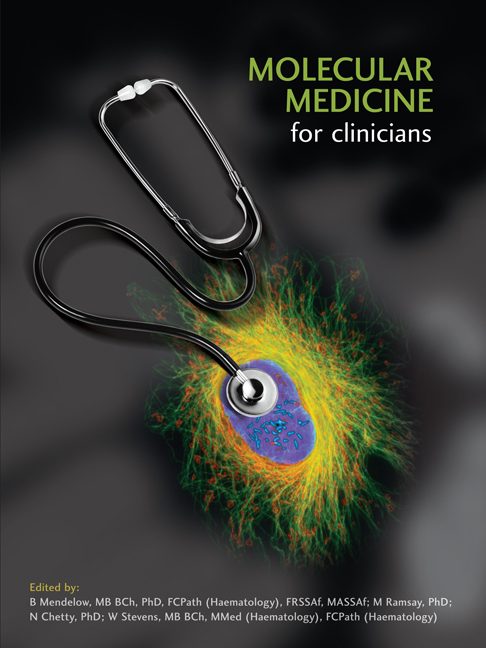Book contents
- Frontmatter
- Contents
- Foreword
- Acknowledgements
- Chapter 1 Introduction
- Keynote Essay 1: Defining Who We Are: DNA in Forensics, Genealogy and Human Origins
- Section 1 Principles Of Cellular And Molecular Biology
- SECTION 2 MOLECULAR PATHOLOGY
- SECTION 3 MOLECULAR THERAPEUTICS
- Chapter 32 Targets for Molecular Therapy: The Biology of Haemostasis
- Chapter 33 Cellular Targets of Antiplatelet Agents
- Chapter 34 Rational Drug Design
- Chapter 35 Chronic Myeloid Leukaemia
- Chapter 36 Gene Therapy
- Chapter 37 Diabetes Mellitus
- Chapter 38 Pharmacogenetics
- Chapter 39 Basic Molecular Biology of Blood Groups
- Keynote Essay 6: Molecular Research Case Study: Developing Novel RNA Interference-based Therapy
- SECTION 4 RESEARCH AND THE CONTINUING EVOLUTION OF MOLECULAR MEDICINE
- Glossary
- Contributors’ Biographies
- Source Material And Recommended Reading
- Permissions And Credits
- Index
Chapter 39 - Basic Molecular Biology of Blood Groups
from SECTION 3 - MOLECULAR THERAPEUTICS
Published online by Cambridge University Press: 04 June 2019
- Frontmatter
- Contents
- Foreword
- Acknowledgements
- Chapter 1 Introduction
- Keynote Essay 1: Defining Who We Are: DNA in Forensics, Genealogy and Human Origins
- Section 1 Principles Of Cellular And Molecular Biology
- SECTION 2 MOLECULAR PATHOLOGY
- SECTION 3 MOLECULAR THERAPEUTICS
- Chapter 32 Targets for Molecular Therapy: The Biology of Haemostasis
- Chapter 33 Cellular Targets of Antiplatelet Agents
- Chapter 34 Rational Drug Design
- Chapter 35 Chronic Myeloid Leukaemia
- Chapter 36 Gene Therapy
- Chapter 37 Diabetes Mellitus
- Chapter 38 Pharmacogenetics
- Chapter 39 Basic Molecular Biology of Blood Groups
- Keynote Essay 6: Molecular Research Case Study: Developing Novel RNA Interference-based Therapy
- SECTION 4 RESEARCH AND THE CONTINUING EVOLUTION OF MOLECULAR MEDICINE
- Glossary
- Contributors’ Biographies
- Source Material And Recommended Reading
- Permissions And Credits
- Index
Summary
All cells express on their surface a multitude of macromolecules that represent potential anti gens when introduced into a ‘foreign’ environment. This simple immunological fact is the crux of the problem of rejection in tissue trans plants and allografts. Red cells, which are no exception to this phenomenon, attracted attention earlier because of the high incidence of casualties, accidents and operations that necessitate blood transfusions. Of the many potential antigens displayed on the plasma membrane of erythrocytes only three, viz. the A, B and Rhesus (or D) antigens, are of real clinical significance in the over whelming majority of instances.
It should be mentioned here that anti - bodies to ‘self-antigens’ occur very rarely. The reason for this fortunate circumstance is that the immune system is ‘educated’ to respect and tolerate self. This educational process commences during fetal life and is completed in very early infancy, and it is believed that it eliminates ‘forbidden’ self-reactive clones of lymphocytes. When for some reason the ‘educational process’ fails, the consequent immunological ‘ignorance’ gives rise to a variety of autoimmune diseases.
ABO BLOOD GROUPS
The core structure of the major blood group antigens (A and B) is the so-called H-substance. H-substance is an oligosaccharide anchored in the red cell membrane by covalent attachment to ceramide (a lipid) and membrane-bound protein. ABO blood groups are determined by the presence of allelic genes coding for glycosyl - transferase enzymes which modify the terminal galactose residue of H-substance: the covalent attachment of N-acetylgalactosamine to the third carbon position of the terminal galactose produces the A antigen, whereas the addition of a further galactose moiety at the same position of the terminal galactose of H-substance produces the B antigen. The O gene produces no transferase that would modify the core oligosac charide; hence the H-substance remains unchanged. The derivation of the major blood group antigens is summarised in Figure 1.
The blood group designations A, B, AB and O indicate the phenotype of an individual's red cells. These red cell ‘antigens’ are inherited according to a simple Mendelian system involving three allelic genes called A, B and O. The A gene controls the formation of A-substance and the B gene controls the expression of B-substance, but the O gene is not expressed.
- Type
- Chapter
- Information
- Molecular Medicine for Clinicians , pp. 438 - 440Publisher: Wits University PressPrint publication year: 2008



